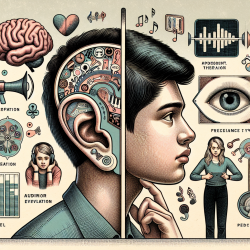Introduction
Central Auditory Processing Disorder (CAPD) is a condition that affects the way the brain processes auditory information. Adolescents, in particular, are at a critical stage where the maturation of the central auditory nervous system is completed. Understanding their self-perception of auditory behavior can provide valuable insights for practitioners working with this population.
Research Insights
The study titled "Adolescents' Self-Perception about Auditory Behavior: Agreement with Parents and Central Auditory Processing Evaluation" offers intriguing findings. It highlights that most adolescents perceive their auditory behavior as "low risk" for CAPD, whereas their parents often rate it as "typical." This discrepancy suggests that adolescents are more attuned to their auditory challenges than their parents might realize.
Practical Implications for Practitioners
For practitioners, these findings emphasize the importance of considering adolescents' self-perceptions in the evaluation and intervention process. Here are some practical steps practitioners can take:
- Incorporate Self-Assessment Tools: Use questionnaires like the Scale of Auditory Behaviors (SAB) to gather adolescents' self-reported data on their auditory experiences.
- Engage Adolescents in the Process: Encourage adolescents to actively participate in discussions about their auditory challenges and possible interventions.
- Educate Parents: Provide parents with insights into how their children perceive their auditory behavior, which can lead to more supportive home environments.
Encouraging Further Research
While this study provides valuable insights, there is a need for further research to explore the correlation between adolescents' self-perception and their actual performance in auditory evaluations. Future studies could also investigate the impact of interventions based on self-perception data.
Conclusion
The study underscores the importance of valuing adolescents' self-perception in the diagnosis and management of CAPD. Practitioners are encouraged to integrate these insights into their practice to enhance the effectiveness of interventions for adolescents with auditory processing challenges.
To read the original research paper, please follow this link: Adolescents' Self-Perception about Auditory Behavior: Agreement with Parents and Central Auditory Processing Evaluation.










